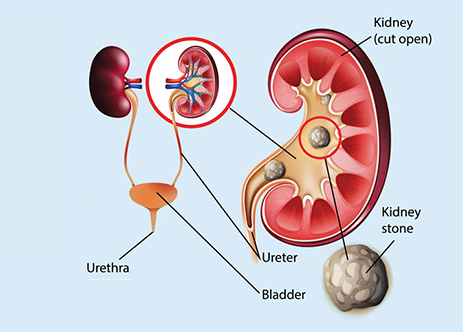Kidney Stones
(please insert pics of few stones from internet, calcium stones, uric acid or struvite stones)
What are signs or symptoms of stone disease?
1. Asymptomatic and incidentally detected on abdominal imaging
2. Symptomatic and may present one or more of the following symptoms:
• Persistent abdominal and/or flank pain, pain that may spread from back or side of abdomen towards
groin, pain that comes in waves and subsides temporarily (colicky pain)
• Nausea and vomiting
• Passage of blood or clots or gravel in urine
• Urinary tract obstruction causing decreased urine output
• Pain during passing urine, fever, foul smelling urine (Infection)
• Decreased kidney function and its manifestations

What are common risk factors for stone formation?
The lifetime risk of formation of kidney stones is about 13 to19% in men and 7 to 9% in women. Almost one in 9 persons may develop stones over their lifetime. The 5year risk of recurrence after first stone event or having second stone formation is almost 35 to 50% in absence of specific treatment. Your chance of stone formations increases if:
• Family or personal history of kidney stones
• Low fluid intake
• Prolonged consumption of diets high in protein, salt, or sugar
• Obesity has been linked to an increased risk of kidney stones.
• Underlying medical conditions may predispose to stone formation: high blood pressure, diabetes, certain GI surgeries and cystinuria may increase the risk for kidney stones.
What tests are done to diagnose kidney stones?
Diagnosis begins with medical history taking followed by clinical examination and blood, urine and imaging tests. Ultrasound scanning, X ray &/or CT scan may be needed to accurately detect the stone, its density and site to guide appropriate management. Whenever available, stone should be sent for stone analysis to characterise its composition so that directed therapies can be used to prevent recurrence.
What treatment options are available for treatment of stones?
Treatment begins with prevention as ‘Prevention is best cure’. Treatment depends upon the site of stone, size of stone, type of stone, presence of infection or obstruction to urinary flow, renal function and patient preference.
As general measure, you need to increase your fluid intake to more than 2.5L per day, cut back on salt intake, avoid fruit juices, soft drinks, cut back on red meat quantity. Stones smaller in size, usually less than 8 to 10 mm may pass spontaneously or with aid of tablets to facilitate expulsion. However surgical intervention may be needed if stones are either infected or causing obstruction or patient symptomatic despite medical measures.
The following types of medical procedures may be needed to treat stones:
• Lithotripsy
• Percutaneous Nephrolithotomy (Nephrolithotripsy)
• Shock Wave Lithotripsy
• Ureteroscopy
About Us
Swanand Kidney Clinic, Shop No. 6,
B Wing, Jai Ganesh Samrajya,
Pune Nashik Highway, Sector 3,
Bhosari, Pune 411039
OPD Number 5, Ground Floor,
Imperial Multispeciality Hospital,
Pingale Pride, Near Radha Swami
Ashram, Chikali, Pune 411062
drsnehalghanwat@gmail.com
Mobile Number:+91 9579747489
